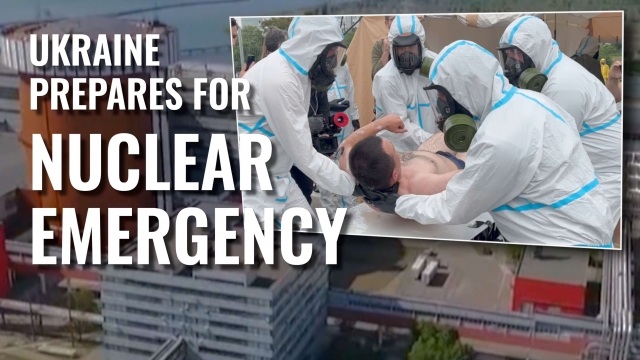Emergency services in Zaporizhzhia, Ukraine, rehearse their plan for how to save lives in a radiological emergency.
The Zaporizhzhia nuclear power plant, the largest in all of Europe, is located just 35 miles away in Russian-occupied territory.
And fears are mounting amid warnings from Ukraine’s leaders that this, at some point in this war, may not be just a drill.
"Now our intelligence has received information that Russia is considering a scenario of a terrorist attack at the Zaporizhzhia nuclear power plant," President Volodymyr Zelensky said last week. "A terrorist attack with radiation leakage. They have prepared everything for this."
Western intelligence has not confirmed Ukraine’s dire warning. But in the wake of a dam blowing up and causing massive flooding, Ukrainians believe the Russians are willing and able to do the unthinkable.
Depending on the wind’s direction, in a radiological emergency, authorities here say around 300,000 civilians might need to be cleared of radioactive dust and evacuated.
Under this scenario, civilians would be offloaded from the buses, and the buses would then have to be decontaminated on the outside and on the inside.
They expect some civilians will need urgent treatment for radiation poisoning and require evacuation by ambulance.
SEE MORE: Ukraine's 'Deep State' map: Fighters use it, 20-somethings run it
Civilians who’ve been decontaminated will come back and be evacuated.
"The most difficult part is to talk to civilian guys: You need to take off all your clothes," said Vadym Tutunnyk, the emergency services team leader, when asked what the most difficult part of decontaminating civilians is.
As the counteroffensive ramps up, the plant could be in even greater peril.
Last September, alarming video showed missiles striking near the plant and shelling a nearby area where critical workers live.
Amid rising global alarm, the International Atomic Energy Agency struck a deal with the Russians to inspect the plant and found blast destruction around the facility. The head of the IAEA called it an "extremely vulnerable" situation.
Authorities are trying to get the word out, encouraging local media to advise citizens on how to prepare, what to pack in a go-bag, and what to do immediately upon being alerted to radiation.
When asked if it's possible to ever be ready for a radiological emergency, Tutunnyk said: "Yeah, we are ready. We are waiting for it. That’s why we’re here."
Authorities say they’d have no way of helping people across the river in Russian-occupied areas near the nuclear power plant as the checkpoints separating the front lines would remain closed. The advice for Ukrainians there is to head south toward the sea.
Trending stories at Scrippsnews.com



